
views
Writing the Introduction

Say hello and introduce yourself. While most people who are present at the dinner may know you, not everyone will. A simple greeting and your name will do. An example of introducing yourself as a part of the speech is “Hi everyone, my name’s Morgan.”
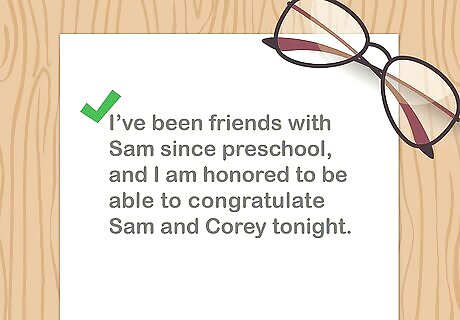
Explain your relationship to the couple. This could be through being a parent, sibling, or a lifelong friend. Include that you appreciate being asked to speak. An example of how to start is “I’ve been friends with Sam since preschool, and I am honored to be able to congratulate Sam and Corey tonight.” If you have a funny story about your relationship with the couple, this is a perfect time to share it. For example, "With the amount of heated competition that goes on during our board game nights, I'm surprised that Sam and Corey are even still talking to me, let alone are letting me stand up here tonight!" It also helps to consider your relationship with the bride and groom. What's your role? What can you offer that's different from other people?

Thank and welcome everyone at the rehearsal dinner. Show your appreciation for all the people who have gathered to celebrate at the rehearsal dinner. Say something along the lines of “Thank you, everyone, for being here to share and celebrate this wonderful occasion.” Now is also a good time to acknowledge any special people in the audience or who couldn't make the event. For example, some family members may have travelled a long way to be at the rehearsal dinner. Saying "We are so happy that John and Anne have travelled all the way from Canada to be with us on this special occasion," works well. Similarly, if there are any special people that couldn't be at the wedding, as they may be unwell or have recently passed away, acknowledge them at this time too.
Forming the Main Body
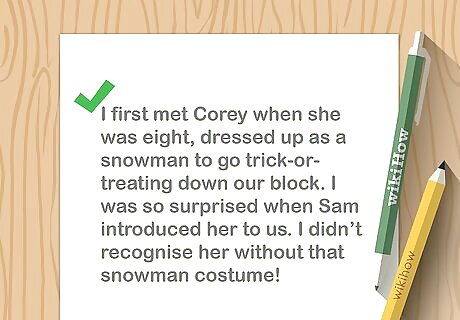
Tell a funny short story about the couple. If the couple met in a funny or unusual way, then feel free to use this as your story, provided that it’s appropriate for the occasion. You could also share the story of how you met the couple or your first impression of the partner. An example of a funny story to share is “I first met Corey when she was eight, dressed up as a snowman to go trick-or-treating down our block. I was so surprised when Sam introduced her to us. I didn’t recognise her without that snowman costume!”
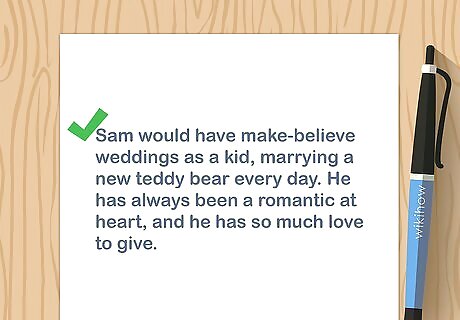
Share a sentimental anecdote if you don’t have a funny story to share. This can be about the childhood of either person or a sweet story about them as a couple. Don’t worry about not sharing a funny story, as sentimental ones are just as well received. An example of a sentimental, childhood tale is “Sam would have make-believe weddings as a kid, marrying a new teddy bear every day. He has always been a romantic at heart, and he has so much love to give. Hopefully the teddy bears don’t find out about what’s happening tomorrow!”
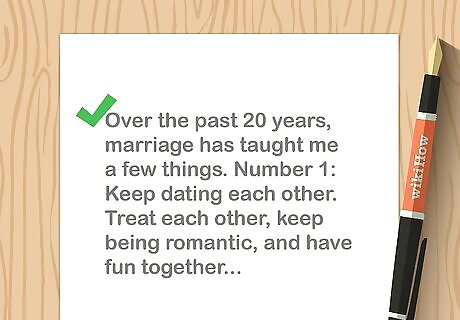
Talk about the meaning of marriage. Think about what marriage means in your own life, or perhaps what the marriage between the couple will mean. Keep it short, sweet, and to the point. You can talk about what marriage means using a few steps if you like. You could try “Over the past 20 years, marriage has taught me a few things. Number 1: Keep dating each other. Treat each other, keep being romantic, and have fun together. Number 2: Never go to bed angry. Sort out your problems as soon as they arise, be kind, and remember that you are both only human. Number 3: Treasure every moment you have. Your relationship is beautiful, so hold it close and keep it growing.”

Use a quote to add depth to your speech. If you are struggling for ideas about the meaning of marriage, then there are plenty of quotes that work well in this part of the speech. Avoid quotes that paint marriage in a bad light, unless you are sure that they will be well received. There are plenty of quotes that work well in rehearsal dinner speeches. Try “We never live so intensely as when we love strongly. We never realize ourselves so vividly as when we are in the full glow of love for others.”(Walter Rauschenbusch). Another option for a quote is “There is only one happiness in life, to love and be loved.” (George Sand). If the couple has a favorite book or movie that includes a love theme, then find a suitable quote from it to make it extra special.

Close the speech with your congratulations and a toast. This part of your speech will nicely round off all that you have said and will make a good segway to the rest of the evening. Ending with “Congratulations to the beautiful, soon-to-be-married couple! Let’s all raise our glasses to Corey and Sam!” is a simple but effective close to your speech. Although most rehearsal dinner speeches end with a toast, this isn’t necessary if there is a different plan in place for when the toasts will happen.

Establish the right tone for your speech. If you are writing a funny speech, keep it lighthearted and avoid overly serious statements. For a more sentimental or serious speech, limit the jokes and use sincerity. If you are having trouble deciding what tone to go for, consider who the guests are and what the couple is likely to appreciate more. If most guests are older relatives and the couple tends to be more serious, stick to a sentimental speech. However if the guests are mostly friends of the couple, and the couple is the more outgoing, fun-loving type, stick to a funny tone.
Presenting the Speech

Practice your speech in the days leading up to the rehearsal dinner. Practice your speech in front of the mirror, or in front of a friend or family member to get some constructive feedback. The more practice you get, the more confident and comfortable you will feel delivering it on the night. While you are practicing your speech, make sure that you speak exactly as you plan to on the night. Practice your tone, body language, and volume just as much as your speech content. If you don’t want to say your speech in front of anyone just yet, record yourself and play it back so that you can hear it from a different perspective. Try and practice the speech until you know it fairly well, and only need to read your notes occasionally.

Bring a written copy of your speech to the rehearsal dinner. Write out your speech on index cards or on a piece of paper. It’s completely appropriate to have a written copy with you, so don’t be afraid to bring it on the night. Having a written copy with you will help to ease your nerves about forgetting what to say. You might not even need to look at it, but knowing that you can if you need to will be reassuring and will help to reduce your stress. Notecards are easier to hold while presenting a speech.

Stay sober until after you have delivered your speech. Although it might seem tempting to drink alcohol to take the edge off your nerves, leave this until the toast at the end of your speech and afterward. Drink some water or a non-alcoholic beverage beforehand to feel refreshed. Avoiding alcohol until you have said your speech means that you won’t say something you might regret and that you will speak to the best of your ability.

Speak slowly, clearly, and loudly. The success of your speech is just as dependent on your delivery as it is the content. Even if it feels unnatural, speak slower than normal, and don’t be afraid to pause. Make sure to project your voice to the room, especially if you aren’t using a microphone. Asking the guests if they can hear you properly before you begin your speech isn’t a bad idea. This means that you can share your speech without worrying about your volume.

Use hand gestures to emphasize certain points. Make descriptive hand movements, such as pinching your fingers together to describe something small, or holding your palms far apart to show that something is big or significant. Using gestures with open palms also helps to build the audience's trust. This will help to keep your audience engaged with what you are saying. Physical gestures are a great way to enhance your storytelling.
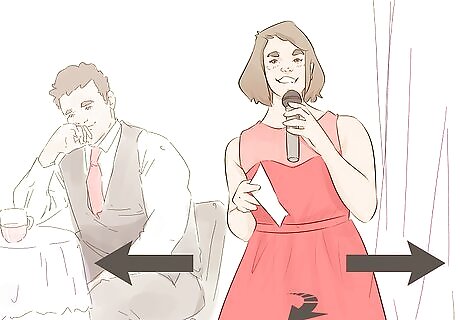
Move around slightly if you don't need to stand behind a microphone. Pick a few destinations in the room that you can comfortably move to during your speech. If you are addressing particular people in the room, feel free to move over to them to draw the attention of the audience. Find a balance between moving around confidently to keep things interesting, yet not looking like you are pacing. Try to remain in each new spot for at least 30 seconds to avoid looking like you can't keep still.

Smile often during your speech. Remember to offer the audience a smile regularly during your speech. You don't need to smile for the whole time, as this looks unnatural, but try to remember to do so after each main point or joke. Stick with your genuine smile. Trying to force a smile can make you look tense and uncomfortable. Smiling during the speech will not only portray warmth, but it will also communicate to the audience that you are happy to be there.

Read the atmosphere of the room as you present your speech. Adjust the way that you deliver your speech according to how the couple and guests look. If people at the back look distracted, increase your volume and project your voice more. Avoid saying sorry during your speech. The audience will appreciate you being confident in your words. Depending on how the audience reacts, you might be able to ad-lib a bit during your speech.


















Comments
0 comment